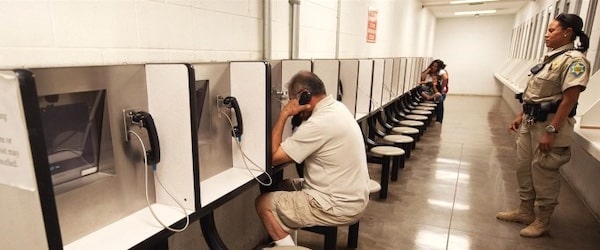In a sweeping shift years in the making, people locked up in state prisons will soon be able to make free phone calls to family members and loved ones, the state prison system announced Tuesday.
People behind bars can use their tablets or facility phones without any fees starting on Aug. 1, according to the state Department of Corrections and Community Supervision.
The move follows the lead of New York City, which in 2019 became the first jurisdiction in the country to make jail calls free after the City Council took action. By contrast, the administration of Gov. Kathy Hochul did it without legislation—making New York the first in the nation to enact such a policy through executive action alone.
“This is about more than phone calls—it’s about fairness, family, and the kind of future we want for our communities,” said state Senator Jamaal Bailey (D-The Bronx), who has long championed the cause in Albany.
New York just took a major step toward a more humane and just criminal legal system.
The upcoming change comes as prison programs and in-person visitation remain limited following a recent three-week corrections officers’ strike—further underscoring the critical need for consistent, affordable communication behind bars. Nearly 3,000 New York National Guard members are still helping staff the state’s correctional facilities.
Historically, the cost of calls was exorbitant, leaving many families to sacrifice groceries, rent, or medicine just to hear the voice of a loved one behind prison walls.
Those burdens fell disproportionately on women—particularly Black and brown women—who are the backbone of support for many incarcerated individuals
“For decades, families across New York have had to choose between their essential needs and staying connected to their loved one behind bars,” said Bianca Tylek, executive director of Worth Rises, a nonprofit that pushed for the change.
Finally, relief is on its way, and it couldn’t be more timely.
Tylek and others spent the past five years trying to persuade the state legislature to enact a phone fee cap or totally eliminate the costs.
Now, an estimated 30,000 families are expected to save a combined $13.3 million annually under the new policy, according to Worth Rises.
In New York, the state’s new telecom contract with Securus Technologies sets the per-minute cost at just 1.5 cents, undercutting both the FCC’s proposed rate cap and California’s already-low 1.6-cent rate.
The estimated yearly cost the state will now cover is $5.4 million, according to Tylek.
That money is included in the state budget, according to the state Department of Corrections and Community Supervision, which did not detail the estimated expense.
Currently, in New York prisoners are entitled to three free calls each week, up to 15 minutes each, but after that must pay 2.4 cents per minute plus service fees, more than triple the rate in other states. For years, the fee was 3.4 cents per minute.
Beyond the financial relief, state officials and experts predict the benefits will ripple through correctional facilities–easing tensions, reducing violence, and helping people prepare for life after prison.
Studies have shown that regular communication with loved ones reduces the likelihood of reoffending and improves behavior inside. One analysis found a 20% drop in violence and similar decreases in disciplinary infractions in facilities where phone access was expanded.
New York now joins California, Connecticut, Massachusetts, Minnesota, and soon Colorado (2026) in offering free prison calls.
The new policy also may also have an unlikely ally.
The New York State Correction Officers and Police Benevolent Association did not comment on the policy. But nationally, corrections officers, often vehemently opposed to reforms, have supported similar policies in other states, noting that stronger family ties can help create a calmer, more stable environment inside.
“Making these calls free is important for the rehabilitation of incarcerated individuals,” Assembly Speaker Carl Heastie said in a statement.
It eases the financial burden on families and improves outcomes both within the facility and in reentry into their community.
The decision also comes just a week after the Federal Communications Commission abruptly delayed a new law that would cap phone rates for incarcerated people, citing unexpected complications.
FCC Commissioner Anna Gomez blasted the postponed implementation of the bipartisan Martha Wright-Reed Act, named after a blind grandmother who was forced to spend thousands of dollars to stay in touch with her grandson because she couldn’t write letters or travel long stretches to make in-person visits.
“We cannot ignore the fact that the burden of inaction falls squarely on the shoulders of families,” she said in a statement.
One in three families goes into debt just to afford phone calls and visits with loved ones behind bars.
Lawmakers who tried for years to legislatively change the policy hailed the new initiative.
“No one should be profiting off a child’s phone call to their parent,” said Manhattan Assemblymember Harvey Epstein, who has also pushed for free calls.
This is a commonsense, compassionate policy–and long overdue.
DOCCS has also increased so-called gate money given to incarcerated people when they are let go from $40 to $200.
On Tuesday, DOCCS Commissioner Daniel F. Martuscello III, said in a statement:
Understanding the value of family ties while in prison is crucial—not only for emotional support, but for improving an individual’s outcomes while incarcerated and when returning to society, thus reducing recidivism.
Reuven Blau is a reporter for THE CITY, with a special focus on criminal justice and the city’s prison system

